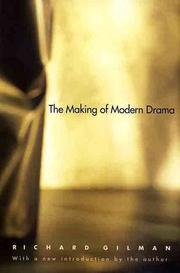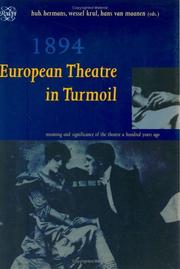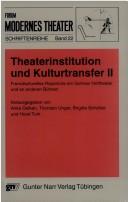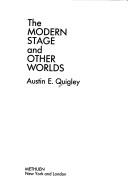| Listing 1 - 9 of 9 |
Sort by
|

ISBN: 0300079028 9780300079029 Year: 1999 Publisher: New Haven, CT Yale University Press
Abstract | Keywords | Export | Availability | Bookmark
 Loading...
Loading...Choose an application
- Reference Manager
- EndNote
- RefWorks (Direct export to RefWorks)

ISBN: 9051839316 9789051839319 Year: 1996 Publisher: Amsterdam Rodopi
Abstract | Keywords | Export | Availability | Bookmark
 Loading...
Loading...Choose an application
- Reference Manager
- EndNote
- RefWorks (Direct export to RefWorks)
Theatrical science --- anno 1900-1999 --- Europe --- Theater --- European drama --- History --- Congresses --- History and criticism --- Congresses. --- Theater - Europe - History - 19th century - Congresses --- European drama - 19th century - History and criticism - Congresses
Book
ISBN: 2876613301 9782876613300 Year: 2005 Volume: *1 Publisher: Chambéry Comp'Act
Abstract | Keywords | Export | Availability | Bookmark
 Loading...
Loading...Choose an application
- Reference Manager
- EndNote
- RefWorks (Direct export to RefWorks)
Etudes sur Vitet, Hugo, Quinet, Gautier, Flaubert, Banville, Villiers de l'Isle-Adam, Polti, Roussel, Kandinsky, Kraus, Tzara, Beckett, Adamov, Sarraute, Arrabal, Cixous, Müller, Novarina, ...

ISSN: 09350012 ISBN: 3823352229 3823352210 9783823352211 9783823352228 Year: 1998 Volume: 21-22 Publisher: Tübingen Narr
Abstract | Keywords | Export | Availability | Bookmark
 Loading...
Loading...Choose an application
- Reference Manager
- EndNote
- RefWorks (Direct export to RefWorks)
Book
ISBN: 3631778600 9783631778609 Year: 2019 Volume: 19 Publisher: Berlin : Peter Lang GmbH,
Abstract | Keywords | Export | Availability | Bookmark
 Loading...
Loading...Choose an application
- Reference Manager
- EndNote
- RefWorks (Direct export to RefWorks)
The author of the book analyses selected 19th-century operas based on Shakespeare's plays from the perspective of their relations to the literature, aesthetics and philosophy of the Romantic period. The texts discussed here include Verdi's Macbeth, Otello and Falstaff, Rossini's Otello, Halévy's The Tempest, Gounod's Romeo and Juliet and Thomas's Hamlet. The study aims to indicate diverse traces of the Romantic interpretation of Shakespeare's works in the history of the 19th-century opera. Individual chapters present the librettos of the selected operas, analysed in the context of Shakespeare's plays and their 19th-century reception, reconstructed on the basis of 19th-century historic-literary texts (of, among others, A. W. Schlegel, L. Tieck and V. Hugo), critical studies and press articles. The analyses conducted in the book succeed in presenting the evolution of the phenomenon of Romantic Shakespeareanism in the 19th-century opera theatre.
Opera --- European drama --- History and criticism --- Shakespeare, William, --- Influence --- History and criticism. --- Influence. --- Opera - 19th century --- Opera - Poland - 19th century --- European drama - 19th century - History and criticism --- Shakespeare, William, - 1564-1616 - Influence --- Shakespeare, William, - 1564-1616

ISBN: 0416393209 0416393101 9780416393200 Year: 1985 Volume: 887 Publisher: New York (N.Y.): Methuen
Abstract | Keywords | Export | Availability | Bookmark
 Loading...
Loading...Choose an application
- Reference Manager
- EndNote
- RefWorks (Direct export to RefWorks)
Theatrical science --- Drama --- anno 1900-1999 --- European drama --- Theater --- History and criticism --- 82-2 --- Toneel. Drama --- Theater. --- History and criticism. --- 82-2 Toneel. Drama --- Dramatics --- Histrionics --- Professional theater --- Stage --- Theatre --- Performing arts --- Acting --- Actors --- European drama - 19th century - History and criticism --- European drama - 20th century - History and criticism

ISBN: 2802801511 9782802801511 Year: 2002 Volume: 92 Publisher: Bruxelles FUSL
Abstract | Keywords | Export | Availability | Bookmark
 Loading...
Loading...Choose an application
- Reference Manager
- EndNote
- RefWorks (Direct export to RefWorks)
L'auteur essaie de faire le point sur les différentes manières dont, au fil du temps, a été considéré et pensé le tragique. Elle essaie ensuite sur base d'analyse de pièces particulières comme "Henry IV" de L. Pirandello, d'établir une filiation entre cet auteur ainsi que R. del Valle-Inclan, et les dramaturges de l'après-guerre : Beckett, Ionesco, ... Elle tend à prouver qu'il n'y a pas, dans l'écriture du drame, une nette cassure due à la deuxième guerre mondiale, mais bien plutôt une continuité, comme si certains dramaturges d'avant-guerre avait senti et compris le malaise des esprits et de la civilisation qui allait déboucher sur la guerre 40-45 et les atrocités que l'on sait.
Theatrical science --- Valle-Inclán, del, Ramón María --- Pirandello, Luigi --- Italiaanse letterkunde --- Littérature italienne --- Théâtre --- Toneel --- European drama --- Tragedy --- History and criticism. --- European drama - 19th century - History and criticism. --- European drama - 20th century - History and criticism. --- Tragedy - History and criticism. --- Bio-Bibliographie --- Ramon del VALLE-INCLAN --- Tragique --- Lazzarini-Dossin, Muriel
Book
ISBN: 290596538X 9782905965387 Year: 1999 Volume: 99 Publisher: Dijon : E.U.D. (Editions universitaires de Dijon),
Abstract | Keywords | Export | Availability | Bookmark
 Loading...
Loading...Choose an application
- Reference Manager
- EndNote
- RefWorks (Direct export to RefWorks)
Romanticism --- Drama --- Romantisme --- Théâtre (Genre littéraire) --- History and criticism --- Histoire et critique --- European drama --- Performing arts --- History and criticism. --- History --- Théâtre (Genre littéraire) --- European drama - 19th century - History and criticism. --- Romanticism - Europe. --- Performing arts - Europe - History - 19th century. --- Dramaturgie --- Romantisme dans la litterature --- Litterature espagnole --- Litterature francaise --- 19e siecle
Book
ISBN: 9052012717 9789052012711 Year: 2004 Volume: 6 Publisher: Bruxelles PIE-Lang
Abstract | Keywords | Export | Availability | Bookmark
 Loading...
Loading...Choose an application
- Reference Manager
- EndNote
- RefWorks (Direct export to RefWorks)
On a pris l'habitude d'identifier la tragédie grecque à son contenu mythologique, la tragédie élisabéthaine à ses intrigues historiques, et le tragique de Racine et de Corneille à la poétique classique. Mais à quoi reconnaître le tragique qui imprègne le théâtre européen des XIXe et XXe siècles? Actes du colloque organisé à l'Université catholique de Louvain en février 2001, enrichis de nouvelles contributions, ce volume tente d'ouvrir de nouvelles perspectives sur ces questions. Pour la première fois, des spécialistes prennent le parti de se concentrer sur des écrivains modernes, salués à des degrés divers comme des rénovateurs de la tragédie : von Kleist, Büchner, Ibsen, Strindberg, Maeterlinck, Tchékhov, Hauptmann, Ghelderode, Garcia Lorca… 
(www.aml.cfwb.be)Qu'est-ce que le tragique ? Et existe-t-il un tragique contemporain ? Fruit d'un colloque, ce volume tente d'apporter, sinon une réponse à ces questions, du moins de nouvelles perspectives. Ses auteurs ont pris le parti de se concentrer sur des écrivains salués, à des degrés divers, comme des rénovateurs de la tragédie : Kleist, Büchner, Ibsen, Strindberg, Maeterlinck, Tchekhov, Hauptmann, Ghelderode, García Lorca… et, transversalement, sur la question du tragique dans les sociétés post-tragiques.
Comparative literature --- Drama --- anno 1800-1999 --- European drama --- History and criticism. --- History and criticism --- European drama - 19th century - History and criticism. --- European drama - 20th century - History and criticism --- Theatre (genre litteraire) --- Ibsen (henrik), 1828-1906 --- Tchekhov (anton pavlovitch) --- Maeterlinck (maurice), ecrivain belge, 1862-1949 --- Ghelderode (ademar martens, dit michel de), auteur dramatique belge, 1898-1962 --- Garcia lorca (federico), 1899-1936 --- 19e siecle --- Histoire et critique --- 20e siecle --- Critique et interpretation --- Vingtième siècle --- Dix-neuvième siècle --- Théâtre --- Théâtre moderne --- Europe --- Tragique
| Listing 1 - 9 of 9 |
Sort by
|

 Search
Search Feedback
Feedback About UniCat
About UniCat  Help
Help News
News